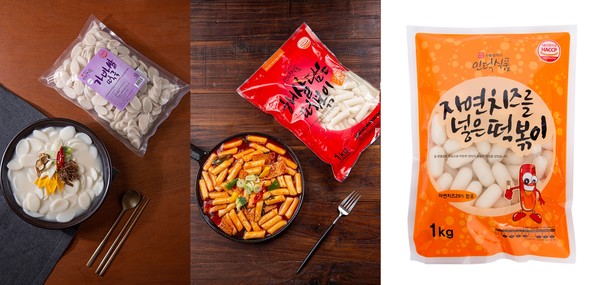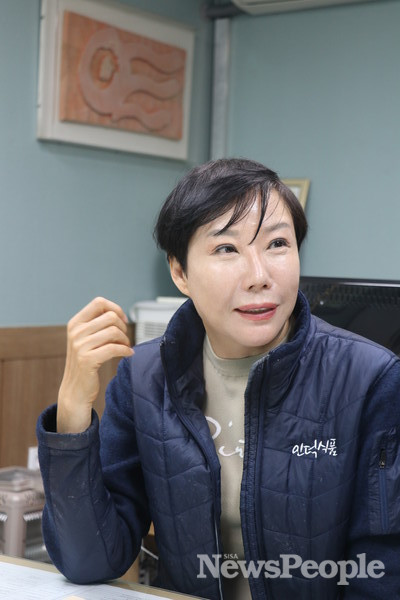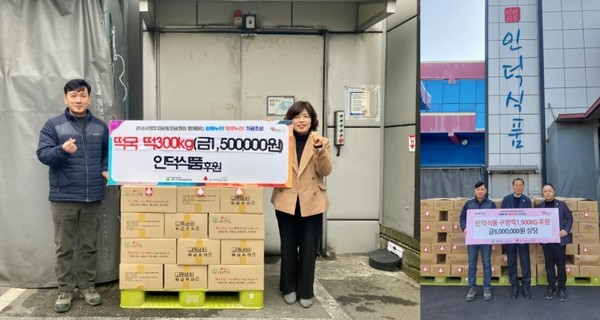CommunityCommunity
Notice
- HOME
- Community
- Notice
Indeok Foods CEO Lee Indeok: “I wish to contribute to the globalization of tteokbokki.”
- 관리자
- 2025-07-15
- Read 69

The global craze for K-food is sweeping across the world. According to recent data released by the Ministry of Agriculture, Food and Rural Affairs, the United States topped the list with $479 million in K-food imports from January to April of this year. The top export items were instant noodles, processed rice products, and kimchi. Processed rice products increased by 58% compared to the same period last year, and the consumption of rice cakes, including tteokbokki, has grown in line with the spread of Hallyu (Korean Wave) culture.
One of the leading companies in exporting rice cake products is Indeok Foods. We had the chance to meet CEO Lee Indeok, who had just returned from an extended business trip to the U.S. CEO Lee stated, “The K-food boom is truly tangible. In our case as well, we expect a significant increase in exports compared to last year,” and expressed his ambition by saying, “In the future, I hope to contribute to the globalization of tteokbokki by establishing a local factory in the U.S.”
Awarded the Prime Minister’s Commendation
Indeok Foods was founded in 2002. For over 20 years, the company has not only maintained its presence in the domestic market but also expanded into overseas markets, thanks to its dedication to producing customer-centered products. Despite higher production costs, they insist on using high-quality ingredients to deliver better taste. Hygiene is another area where the company spares no effort. They acquired HACCP certification early on and have divided their production areas into contaminated and uncontaminated zones. Critical control zones are strictly separated from general work areas and managed thoroughly through employee training. For pest control, they work with CESCO for focused management.
When it comes to quality control, the company conducts inspections both in-house and through certified third-party institutions to ensure product excellence. Their main products, tteokbokki and tteokguk (rice cake soup), are currently supplied to Top Mart, a leading supermarket chain in the Busan-Ulsan-Gyeongnam region, and also delivered through OEM contracts to a major conglomerate. Indeok Foods has also participated in numerous prestigious international expos, further paving the way for export opportunities. In 2020, their rice cake products received halal certification in Indonesia.
Thanks to these consistent efforts, the company received the Gyeongsangnam-do Agricultural and Fishery Export $500,000 Tower Award at the 26th annual ceremony. Last year, CEO Lee was also honored with a Prime Minister’s Commendation in recognition of his contribution to strengthening agricultural competitiveness and advancing the national industry.

What is the competitive edge of Indeok Foods? CEO Lee Indeok describes it as "a product that never changes." According to him, machines are like people—if you feed them and clean them as much as you use them, the quality of the product naturally follows. In fact, he spends a lot of time researching machinery. All the automation equipment currently used at Indeok Foods were designed by him. He can even pinpoint exactly where a problem is just by listening to the sounds coming from the machines.
CEO Lee explained, “Food is science. Taste can only be achieved when all factors such as external environment, temperature, and the content of additives are perfectly aligned. We are a company that keeps pace with the evolving food tech industry.”
Thanks to this unique conviction, they also launched a new product line using GABA rice — the ‘GABA Rice Tteokguk’ — which enhances texture and promotes health.
GABA rice is cultivated from the ‘Geumtap’ variety developed by the Industry-Academia Research Team at Yeungnam University. It contains high levels of GABA (Gamma Aminobutyric Acid), a brain-activating substance that promotes brain cell metabolic functions and acts as a neuro-relaxant. The GABA content is eight times that of brown rice and over four times that of black rice. It is also known to stimulate kidney function, increase energy consumption, and normalize enzymes related to blood sugar, making it effective for diabetes management. The Rural Development Administration announced that consumption of this rice leads to a 9.3% reduction in body fat and a 39.6% decrease in insulin levels.
Already in the U.S. and Japan, GABA has been certified as a functional food additive and is used as a medicinal ingredient. In Japan, companies are accelerating related product development, introducing health-conscious items such as beverages, chocolates, and chewing gum.

Considering Industry Characteristics, the Path to Skilled (E7) Visa Should Be Opened
What truly makes Indeok Foods shine is its mission-driven spirit of generosity and virtue. For over a decade, the company has consistently extended love and support to marginalized neighbors, elderly living alone, and others facing hardships. At the end of last year, they donated 500 kg of rice cake slices for tteokguk to the Gimhae Eastern Senior Welfare Center. For this year’s Lunar New Year, they contributed 300 kg to the Gimhae Western Disabled Welfare Center, and in March, they donated 1,500 kg of gumeongtteok (hole-punched rice cakes) to seniors living in welfare blind spots.
Due to the nature of the industry, many foreign workers are employed. CEO Lee Indeok personally visits their hometowns, witnessing their difficulties firsthand and providing support. Recently, the company sponsored a groundwater development project in the Philippines.
CEO Lee emphasized, “The key to growth is our employees. Because of them, we can set new visions.” He added, “Our staff are like family, and I always feel grateful to them.” Perhaps for this reason, Indeok Foods has implemented a high-level welfare system, including incentives and point-based rewards.
When asked about industry challenges, he said, “Non-skilled (E9) visas should be convertible to skilled (E7) visas.” He explained, “What certifications exist for the food industry? For cooks, producing food is different from manufacturing. Considering the nature of each industry, if someone worked under an E9 visa and then returned home but is rehired, their skills should be recognized and the E7 visa granted.”
He further expressed hopes for the establishment of a Busan-Ulsan-Gyeongnam food cooperative. “All companies in the same industry face difficulties relocating their factories due to wastewater treatment issues. Currently, only Samyang Foods is operating in the Miryang Nano Convergence National Industrial Complex, which has all the treatment facilities. If there were a cooperative, we could raise our voices more effectively and potentially relocate to an industrial complex in the future,” he explained.
Source: Sisa News People — In-depth interview with excellent companies by reporter Yongjun Park
https://www.inewspeople.co.kr/news/articleView.html?idxno=35227
